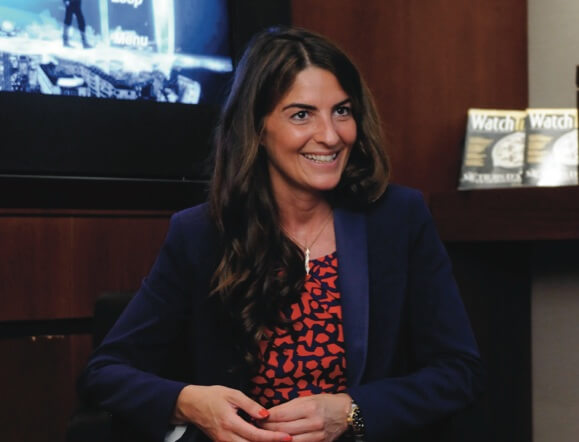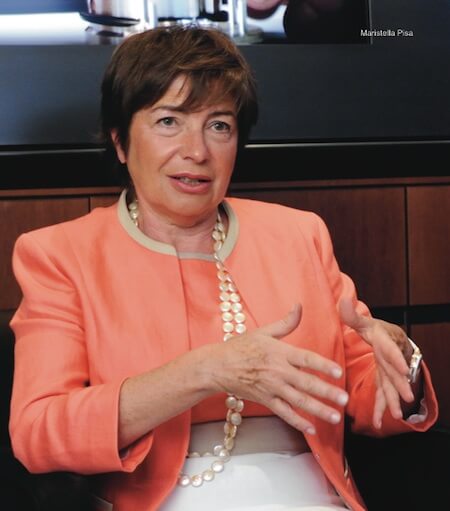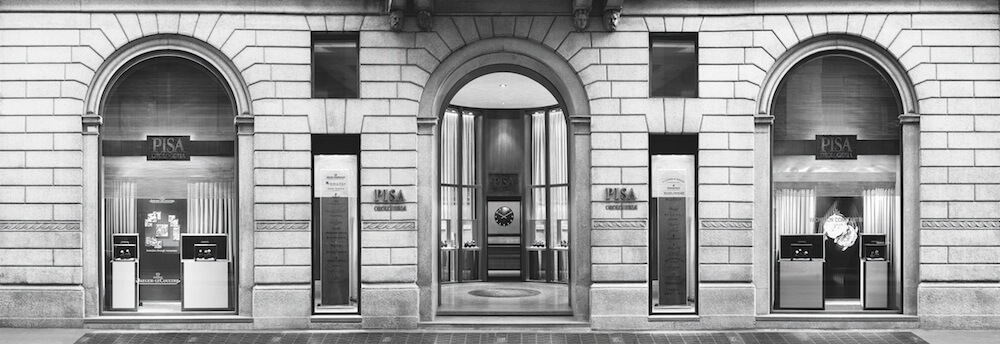Interview with Maristella and Chiara Pisa
Located in the heart of Milan, the Via Pietro Verri and the Via Montenapoleone are reminiscent of an elegant past. The neighbourhood once hosted the great families of Italian high society and today presents the shop windows of nearly every important high-end fashion brand found worldwide. An 18th century building nestled firmly into the historic locale displays a large bronze plaque emblazoned “Pisa Orologeria” inviting one to step into the world of the Pisa family. Sitting with mother and daughter team Maristella and Chiara Pisa at their multi-brand store in Via Verri, makes clear how active the pair has been in acting as a distributor for some of the most famous watch brands in the world. The ladies hold court in a delightfully elegant lounge, where with Tharawat magazine they discuss fathers, uncles, sisters, mothers, daughters, and how instrumental each have proven in making possible the legacy of their business.
The two brothers
Maristella Pisa proudly states that her family has been in the watch business for nearly 50 years whilst stroking her furry companion Grace, a gentle terrier lying within arm’s reach. Decades ago, Pisa started working in the family business established by her father and uncle. Ugo Pisa and his brother Osvaldo founded Pisa Orologeria in the 1940s in a small workshop in the Via Pietro Verri. Osvaldo was a great watch repairman and Ugo an eccentric entrepreneurial visionary, a serendipitous coupling, which resulted in the establishment of their joint enterprise in the city centre. “My father Ugo told me that they started with the reparation of watches and only later became distributors. They started with small brands. But then they landed the distribution deal for Rolex. At the time Rolex, contrary to the tastes of people who were used to flat mechanical watches, designed large, automatic, self-winding, waterproof watches, which was a revolution. Ugo Pisa was the right man for the job,” says Maristella.
“People didn’t believe it was a good watch. My father introduced it and convinced people to buy though,” she reminisces. Her daughter Chiara joins in laughing: “They used to put the Rolex watch in an aquarium in the shop window! Just to show that it is water proof!”
Rolex was followed by Piaget, Cartier, and Vacheron Constantin among many others and the Pisa brothers used their newfound success to expand the enterprise exponentially. Maristella remembers her father fondly: “Many brands followed and made him successful. We have managed to retain successful relationships with most of them for decades.”
“We always convince the brands to stay with us because we never give up,” says Chiara, who despite never having met her grandfather has clearly inherited his characteristic determination.
The two sisters
When Ugo Pisa passed away, his two daughters of whom Maristella was the younger, were confronted with a difficult decision. “My father died in 1971 when I was 22. What were we to do with the business? My sister who is five years older than me had worked with my father before. So we decided to take over the family business together,” she says. Though Maristella does not dwell on she and her sister’s achievements, her daughter Chiara is keen to underline the magnitude of this decision. “Taking over your father’s business is difficult enough. But doing so as two young women in their twenties, and at that time, is more complex than it may seem today.”

No matter the initial obstacles overcome, the unusual journey of the women of Pisa Orologeria was only just beginning. “After 40 years of working together, my sister decided to retire two years ago and I became the sole owner of the business. It was a big challenge for me as usually such changes in ownership happen by the third generation of the family business. I could have sold the company when my sister left but I didn’t. It was more than just buying her part of the business to continue on my own; it was imagining running this business without her. We have a great relationship and have worked together successfully for decades.” Chiara was already working with her mother and aunt when this transition occurred and confirms that the shift was not easy, yet handled masterfully by her mother. “I joined the business in 2006,” she says. “I worked with my mother, my aunt and with my cousin. We were four women in the business. My cousin left when my aunt did because she wanted to spend more time with her children. Also my aunt retired properly and did not linger in the business. She gives advice but she respects the new structure and is happy in her retirement.”
The daughter
Chiara studied economics and worked in the watchmaking industry before feeling compelled to join the family business. “My grandmother died in 2004. I thought that this would be an upsetting time for my mother and aunt and I wanted to help. So I joined the business. But these women are so strong and they had some ambitious expansion plans growing from one small store to an additional two locations, including the one in Via Montenapoleone. It was a big investment and I thought I could help. To be honest they didn’t need my support but it was great to be part of the expansion,” says Chiara modestly.
The firm’s growth was motivated by a need for space explains Maristella. “Our first shop was really small and in that space we had more than 30 brands. But it was not big enough for us to flourish. At the same time somebody proposed we buy the two shops in Via Pietro Verri and Via Montenapoleone,” she says. The family business now has one of its points of sale dedicated solely to its representation of Patek Phillippe, another to Rolex and the third store which hosts multiple brands.
Mother and daughter
When asked of what it’s like to work together as mother and daughter, the two respond rather naturally. “I don’t think anything has changed,” declares Chiara. “I grew up with the idea of my mother as a business woman. But at the same time she is a warm and loving mother. Characteristically I am more like my father, who is a kind and quiet man. When I started working with my mother she taught me to be more outgoing and to have confidence in myself. But she was always my mother even in the workplace and kept asking me if I needed anything.”
Chiara looks at her mother lovingly and Maristella responds with equal affection. “I forget my role as a business woman and I am just a ‘mama’. I want to take care of my girl. For a mother this urge will never change. When Chiara joined I wasn’t worried, I was very confident that she would be happy,” says Maristella with confidence. “I am someone who is intuitive, I throw a stone into the lake and observe the ripples. In the future we will continue to take risks and grow, and we have great plans for the future,” she smiles mysteriously.
“Now I am alone but I think that at the moment that is a good thing because I can make faster decisions,” explains Maristella. “But everything in our family business has taken a rather natural course. When my father died, my sister and I took over, and now my sister left and my daughter is with me. It is a beautiful business not only for money. The money was never the focal point in my life. The focus was and is to grow the company for my daughter and for the staff. It is not about the riches; what I need, I have,” says Maristella.

Chiara adds, “We are about 50 people in the business now. Many of them have been with us for the past twenty years. To my mother and me, they are family. I know it is a business but it is a family as well.”
A strong entrepreneurial intuition exists across Pisa Orologeria. But how do these women keep making the right decisions? Maristella answers candidly: “Managing with two decision-makers was slower and I have been able to achieve growth more quickly ever since I have been the sole owner. Speed is of the essence and sometimes decisions have to be made on the spot. Step one is to understand the opportunities and step two is not to hesitate. This is what allows us to survive.”
Ineffective decision-making catalysed by sluggishness or incompetence has often led to the demise of many family businesses which surround the Pisa family, explains Maristella: “Our business started together with other family businesses along the same street, they are now disappearing. In Via Montenapoleone there are maybe two families left and all other spaces have gone to the big brands. This happened mostly in the 1980s when the fashion industry started facing enormous competition and the families had to sell out. It is happening in many industries and in many cities; the little stores and the old family businesses are vanishing.”
“For me it was strange and sad to watch these family businesses disappear,” says Chiara. “Sometimes the reasons are unclear but most of the times it’s the competition that puts them out of business.”
The husbands
Pisa Orologeria is shaped by two generations of female leadership. These elegantly confident women are blunt in making clear which key factors contributed to their success. “You have to leave the husbands outside the business,” exclaims Maristella. “It is not easy and it can have a bad effect on your private life. But it is better not to involve them. For me it was easy because my husband is an architect and wasn’t interested. But even if he had been, the business was between us women and that is how it will stay.”
Both Maristella and Chiara apply this policy to support work-life balance: “When you come back home you have to be able to speak of more than business. When I close up the shop in the evening, I walk for 50 metres and I don’t think of the business anymore,” says Maristella. “I think about my home and I think about nothing else.” She has acquired this habit from working with her family since a young girl. Chiara who is still struggling with switching off in a similar manner worries, hoping that she too will in time be able to adopt her mother’s attitude.
The solidarity between mother and daughter is palpable. And it extends beyond familial ties and to all the women in the company. Says Maristella: “You can have it all if you are well organised and when other women stand beside you and help you. Being a mother will always be the priority to women, but we should enable them to also have a great career by supporting each other.”
The determination, which the ladies of Pisa Orologeria exude, surely leaves an impression on anyone whom encounters them. Walking down the Via Pietro Verri, one cannot help but hope that this time-honoured family business will continue to defeat the odds and unlike its fallen peers persist in their success.

Tharawat Magazine, Issue 23, 2014
Original interview posted on Tharawat Magazine
Featured Picture Courtesy of Pisa Orologeria
